a week where decades happen
a week where decades happen
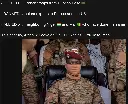
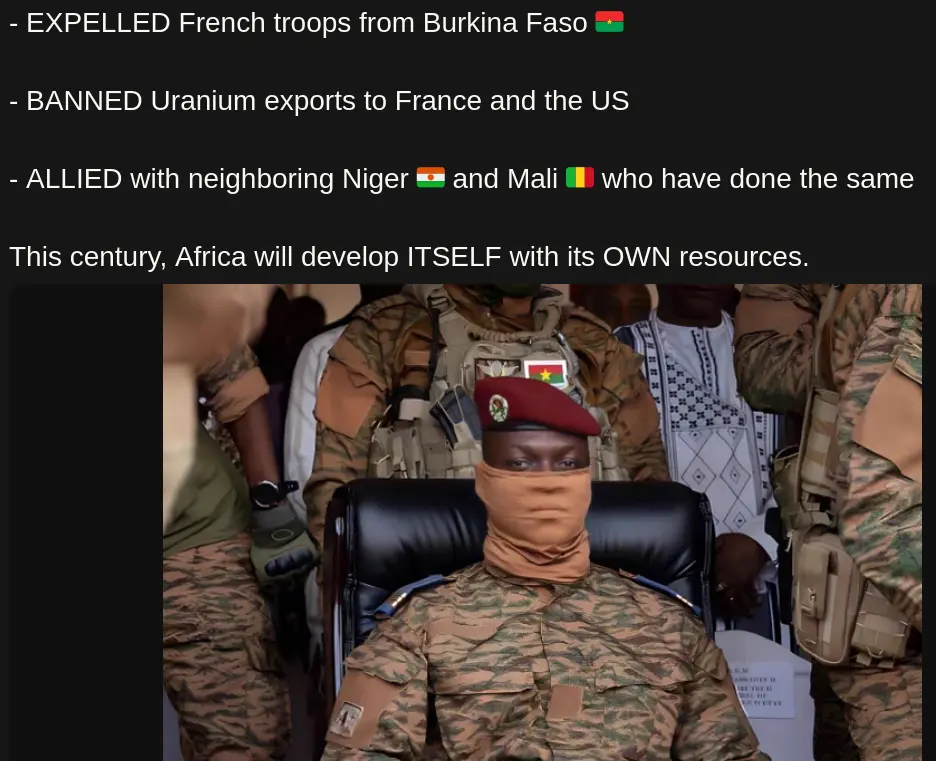

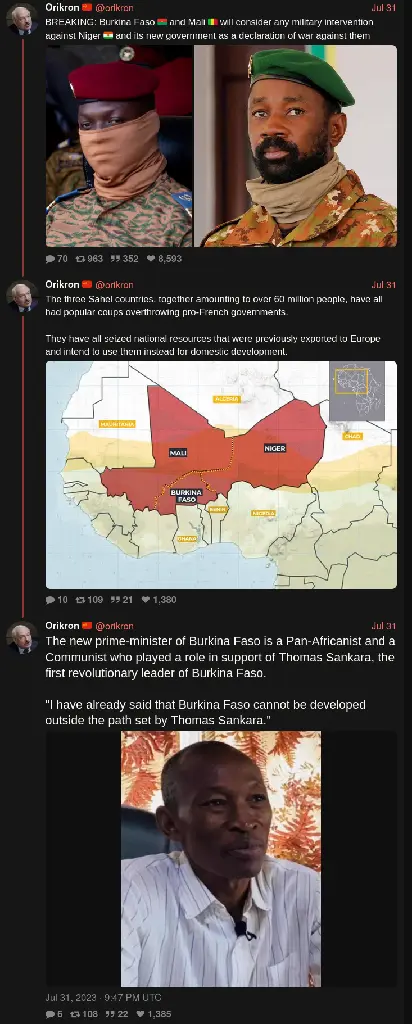
a week where decades happen




“I have already said that Burkina Faso cannot be developed outside the path set by Thomas Sankara."
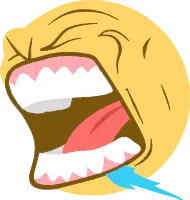
The last bit literally almost made me cry, Burkina Faso being set back on the path Thomas Sankara was leading it down. Good things actually fucking happening for once
But can it be defended. That is to be seen.
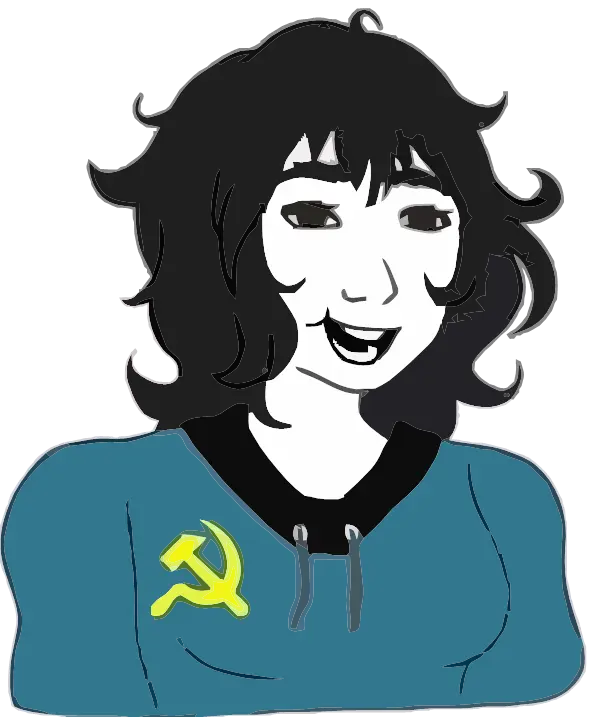
Important to be cautious. Hope for the best but don’t be shocked by worse. Pessimism of the intellect optimism of the will.
I’d be interested whether other comrades with could suggest actually good source and analysis (preferably in French) that shed light on the current domestic situation in terms of the internal, domestic politics and policies of the current government in Burkina Faso. Really hope that it’s a case of genuine revolutionary currents within the military and not simply a leveraging of the popularity of pan-Africanist and anti-imperialist language and ideas and individuals like Sankara to ensure political legitimacy.
Quick, let's start tricking the libs into supporting this by comparing it to Wakanda, before the State Department starts their propaganda!
Oh fuck, that's what it's going to be isn't it? Martin Freeman and a Hologram of Chadwick Bozeman in costume as their characters from Black Panther shaking hands while a voiceover tells us that sending weapons to arm freedom fighters death squads is actually a good thing and that "With your help, we can make Wakanda possible. Vote Biden. This message sponsored by the Raytheon organization for a brighter tomorrow."
monkey's paw finger curls
Libs: Burkina Faso (Wakanda) has been taken over by Ibrahim Traore (Killmonger), the West (the Avengers) must help restore Democracy (Black Panther).
Oof my stomach
Bring in the CIA! We need them to save the day
Too late, already saw libs crying about muh Russia
I think that's unlikely with Burkina Faso at least, unless the president and prime minister get assassinated of course
now this is some af-frickin' great news
typical nato lib imperialist take was oooo of course it happened where Wagner was sent, looks like Putler has a master plan blah blah blah.
Spare me, maybe the people of the Sahel want to set their own path instead of what France and Macron tell them is best in order to better France.
Wouldn't be the first time a bloody international murder-suicide in Europe loosed the grip on the rest of the world long enough for people to wiggle free.

Still wondering if this emoji was named sankara-bass to annoy me personally
That's a fucking guitar, revisionist scum!
Given the time frame when he got it, I think there's a solid chance that it's a USA-made Fender Stratocaster. In other photos, you can tell that it's the non-CBS era headstock, and it has a rosewood fingerboard. The 1954-1958 models only came with maple fingerboards, and the chonky CBS headstocks started in 1965 (through 1981). His band, Tout à coup Jazz, was mostly active in the 70s (with one show in '84), so that is most likely a second-gen Stratocaster (1959-1964) in either Dakota Red or Fiesta Red. That looks like gold hardware, too, which was an available factory option in '59-'64. (If that photo is from '82 or later, then all bets are off, because that was when Fender started producing them in Japan, pre-Squier.)
Other angles:
Sidenote - anyone ever been able to find recordings of his music? Closest I've got is Volta Jazz and a few other groups that he supposedly watched play, or played with the one of members of at some point.
Pretty exciting news. Hoping things work out.
The HeLa settlement was a pretty nice development, too.
Or maybe not.
Most westoids think of coups in Africa as just something that needs to be stomped out once in a while. I doubt they'll need much convincing for an intervention.
If the French just use proxies in Nigeria then westerners can ignore it, or say it's just "a war between those people" and then ignore it
Absolutely love to see it. Here is to hoping these folks can stand up to western imperialism! A daunting challenge no doubt.
We might be seeing something akin to the wave of decolonization following WWII.
Ukraine has sapped the financial, military, and social strength of most Western countries. Even the US is running low on artillery shells and rockets to send to Ukraine, with the EU countries faring even worse. Add to that the general economic malaise brought upon by sanctions against Russia, and people (especially in France) rioting as a common occurrence, the colonial subject countries are sensing weakness in their masters and opportunities for themselves.
It started with "enemy" states like Iran growing bolder by selling drones to Russia and China creating alternative payment systems, to stronger vassals like the Gulf States agreeing to sell oil in Yuan and aligning away from the US. None of this was conceivable even 5 years ago, and any country which tried would have been bombed into oblivion like Libya.
Now it appears like even the weaker colonial subjects, the ones with less to lose, are trying their hand at escaping the orbit of their colonial masters. I hope it plays out well for them, but I doubt the West, even weakened as it is, will let them get away with it lightly.
Even the US is running low on artillery shells and rockets to send to Ukraine,
how the fuck are we low on ANYTHING when we spend $700 billion each fucking year on the pentagon?
$52,000 trash cans probably don't help.
Western MI complexes are built for profit, not sustained combat. Even during the occupation of Iraq and Afghanistan there were munitions shortages, and that wasn't against a conventional military.
Because the US military, like everything else in the US, is a massive grift with no thought given to long-term consequences. As a result, the actual industrial output of the MIC is miniscule compared to its budget. I don't have a direct source but saw it here elsewhere before, but Russia makes something like a million artillery shells a year, and the US makes 65,000.
Edit: I researched the numbers out of curiosity, and the ratio is less lopsided. The US currently makes around 168k shells a year and Russia made 750k shells in 2021. Given how much smaller Russia's economy is though... Oof.
That’s the efficiency of PrivatizationTM baby. What do you mean it can’t actually compete with planned economies and that’s why in conflicts that actually stress countries they start mobilizing the economy? That’s crazy tankie rambling, the invisible hand can’t be beat!!!
Corruption
Most eficient system ever.
Every time some wayward youth pulls the trigger on a javelin missile system, it's ~$180,000.
All of it goes to like 6 planes and 2 ships and the army just wastes like a billion bullets firing them into hillsides
I was offline for like 48 hours and missed a coup? Gaddam
The geographical outline of these states is like the international batman symbol.
Put THAT on screen next time Nolan, you artless hack!
Not only is this good news but also I can't help notice what a good look that facemask/scarf is, dude looks really cool in that
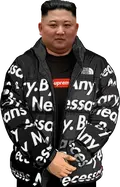
Somewhat related, does anybody know the strength of Wagner forces in Africa? They're just a small band of mercenaries but they seem so influential in Africa
Do they have modern fighter jets? Any submarines? Any modern heavy artillery? Access to Russian satellites? etc.
I believe they have (or at least had, pre-mutiny) cargo planes and older ground attack jets like SU-25s and plenty of artillery, but no submarines and as far as I can tell no modern air superiority fighters to speak of. I'd presume access to Russian military technology like satellites would depend on their current contract but I could be wrong.
I'm just going to pretend like they don't exist and make fun of the libs who bring it up as conspiracy theorists, like they have done about the CIA for decades. 'Suuuure, Russia is behind all these coups? So they're all powerful? Sounds a bit out there man'
You love to see it. I'm also super excited for the political discourse in 10 years when France is trying to put together a UN pEaCeKeEpInG coalition to invade and we'll get a partisan split in the US about whether we'll support them where republicans will bring up France's position on the invasion of Iraq and also somehow be racist about it and dems will shame you like you're a nazi for not wanting to carpet bomb Africa
LET'S
FUCKING
GO

No doubt Russia and China will want to take advantage of this with a nice face on

tbf expelling French troops is kind of a big deal, isn't it?
get outta hea frogs
Russia and China getting involved is the better outcome than Russia and China not getting involved.
There's very little chance that these countries don't get crushed for spitting in the face of the collective West without outside help.
All we need is China and Russia to put enough weight on Algeria that they stand with the other West African nations and oppose French/Nigerian intervention. Algeria is by far the biggest power in the region
Has this been confirmed by a source that isn't social media screenshots?
Which part? There are many western news sources reporting the coups. As for the claims in the post about banning this or that export, kinda seems like a premature announcement when they only tentatively have control over the nations right now.
Anglo newscasters putting on increasingly French accents as this unfolds
:sicko-yes:
According to our tradle website the following are the main exports/imports of the countries and their destinations:
Burkina Faso $9 billion exports
Niger ~$4 billion exports
85% of uranium is produced in six countries: Kazakhstan, Canada, Australia, Namibia, Niger, and Russia. Historically, conventional mines (e.g. open pit or underground) were the main source of uranium.
Mali $9.4 billion exports:
In terms of import
A note on gold, the world wide (raw and slightly cleaned) gold production amounts to:
Within the last 5 years the gold price rose by a third (it was volatile the years before). Leading to both higher value for the same exported amount, as well as increase in extraction activities. This was one of the main reasons for the increase in exports.
Burkina Faso and Mali got ~$2500 GDP per capita in PPP, Niger less with $1500. The countries got around 20 million people each, with Niger having a bit more with 27 million. The countries have a very young population.
Taking Niger as example, trade accounts for a quarter of GDP. The service amount of the GDP varies between 10-15%. Goods are still dominant within it. Remittance don't play such a high role. External international investments are important, too, and nearly reach the value of exports. Those sources I can't tell anything about but sanctions could be leveraged at this place as those investments are needed to streamline productive facilities outside the gold mining area.
(e.g. open pit or underground)
Sorry to nitpick, but underground is the the wrong word for what you're describing here, the correct term would be either be deep pit or deep cast (doesn't matter which, they mean the same thing).
How did I not know that burkina faso has a pan africanist sankara supporter as their PM??? This is all so wonderful I'm so happy, literally tearing up!

excited to watch the general opinion of French people change from "cheese-eating surrender monkeys" to "strong-jawed defenders of democracy" in a few weeks time
no no no they're still violent entitled rioters!!
Fuck yeah, good for them.
I've heard good things about Burkina Faso but does anyone have any actual information on if these countries are on a good track?
the less "developed" (i.e. the more exploited by imperialism) a country is, the harder it is to get reliable information on what "track" they're on, especially in languages spoken in the imperial core (English, French, German, etc.) Since discussions about these countries usually center on their "sustainable development," i.e. adopting neoliberal economic policies, taking high interest loans from the imperial core, selling their labor to the imperial core for cheap, letting imperial core capitalists build and own their critical infrastructure, allowing imperial core military presence, deregulating their markets and safety standards, privatizing their state owned enterprises, allowing child labor, disallowing unions, etc.
For example, the wikipedia section for the political history of Burkina Faso starts in 1990, years after the assassination of Thomas Sankara, and nearly a century after French colonial domination of the country in 1919.
I get that they've got an anti-imperialist bent but what's the politics here?
Anti-imperialism is political, but I get your question. You're asking how they are socially and economically instead of their foreign policy towards the imperial core. Burkina Faso is a majority Muslim country, though Christianity and indigenous beliefs are also significantly represented.

An estimated 70 languages are spoken in Burkina Faso, of which about 66 are indigenous. Mooré is spoken by about 52.5% of the population, mainly in the central region around the capital, Ouagadougou. French is the official language, due to colonialism.
French is the primary language of government, politics, courts, public services, media, and schooling. Fewer than 15 percent of the population uses French on a day-to-day basis. Existing institutions gatekeep people on the basis of whether they speak French. Here's an ethno-linguistic map of Burkina Faso.

They’re also asking whether there’s any reliable info or sources on whether this government is actually more progressive in terms of its internal domestic policies, as opposed to the more limited question of whether it’s opposition to western imperialism is positive, which is a fair question to ask as it is a military government and we known how those generally end, including when they burnish themselves with progressive, in particular pan-Africanist and anti-colonialist credentials (just look at rhe Derg).
Some say overthrowing the French government was the birth of socialism, and an analysis of history worldwide will show overthrowing the French government to be one of the most successful paths of socialism.
Do we know anything about the "democracy" that elected the previous comprador governments? Was it the usual shitshow of western NGO's and local compradors owning the media and dominating politics?
What do we know about popular support for the new administrations? Would people of the Sahel be willing to fight for independence from the French?
post hog